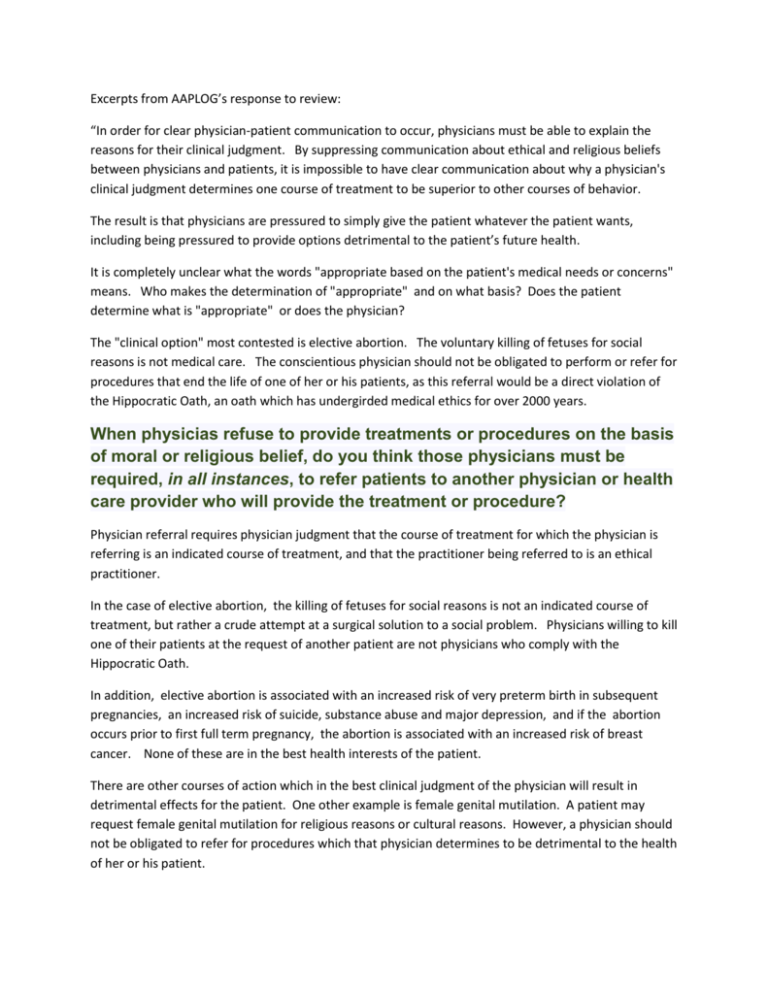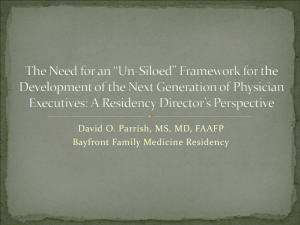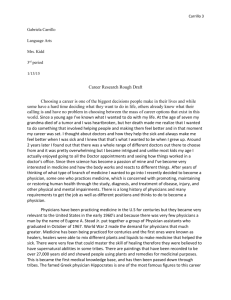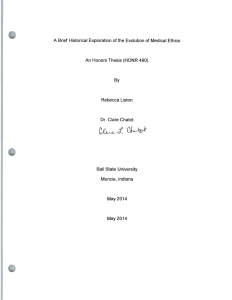Excerpts-from
advertisement

Excerpts from AAPLOG’s response to review: “In order for clear physician-patient communication to occur, physicians must be able to explain the reasons for their clinical judgment. By suppressing communication about ethical and religious beliefs between physicians and patients, it is impossible to have clear communication about why a physician's clinical judgment determines one course of treatment to be superior to other courses of behavior. The result is that physicians are pressured to simply give the patient whatever the patient wants, including being pressured to provide options detrimental to the patient’s future health. It is completely unclear what the words "appropriate based on the patient's medical needs or concerns" means. Who makes the determination of "appropriate" and on what basis? Does the patient determine what is "appropriate" or does the physician? The "clinical option" most contested is elective abortion. The voluntary killing of fetuses for social reasons is not medical care. The conscientious physician should not be obligated to perform or refer for procedures that end the life of one of her or his patients, as this referral would be a direct violation of the Hippocratic Oath, an oath which has undergirded medical ethics for over 2000 years. When physicias refuse to provide treatments or procedures on the basis of moral or religious belief, do you think those physicians must be required, in all instances, to refer patients to another physician or health care provider who will provide the treatment or procedure? Physician referral requires physician judgment that the course of treatment for which the physician is referring is an indicated course of treatment, and that the practitioner being referred to is an ethical practitioner. In the case of elective abortion, the killing of fetuses for social reasons is not an indicated course of treatment, but rather a crude attempt at a surgical solution to a social problem. Physicians willing to kill one of their patients at the request of another patient are not physicians who comply with the Hippocratic Oath. In addition, elective abortion is associated with an increased risk of very preterm birth in subsequent pregnancies, an increased risk of suicide, substance abuse and major depression, and if the abortion occurs prior to first full term pregnancy, the abortion is associated with an increased risk of breast cancer. None of these are in the best health interests of the patient. There are other courses of action which in the best clinical judgment of the physician will result in detrimental effects for the patient. One other example is female genital mutilation. A patient may request female genital mutilation for religious reasons or cultural reasons. However, a physician should not be obligated to refer for procedures which that physician determines to be detrimental to the health of her or his patient. The Ontario Human Rights Code as currently formulated shuts down needed clinical discussion between physicians and patients about the reasons for physicians prescribing courses of action. Human beings are holistic entities, and some medical procedures have social and psychological consequences beyond the physical consequences of the procedure. Procedures which involve killing patients at either end of the continuum of life violate the deepest principles of medical ethics as embodied in the Hippocratic Oath. When governments or patients request violation of Hippocratic medical principles, and physician reasons for refusing to kill patients are labelled as "religious" then the Ontario Code as currently written serves to silence physicians who have conscientious objections to killing the human beings entrusted to their care. This organizational silencing of dissension serves to decrease, not increase the diversity in the medical profession.







